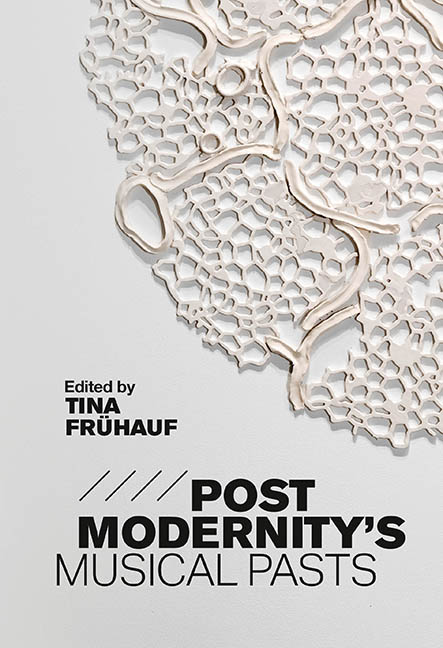Book contents
- Frontmatter
- Dedication
- Contents
- List of Illustrations
- List of Music Examples
- List of Contributors
- Acknowledgments
- About the Cover
- Introduction
- Part I Time and the (Post)Modern
- Part II Manifestations of History
- Part III Receptions of the Past
- Part IV Nostalgias and the Temporalities of Belonging
- Bibliography
- Index
4 - Germany, Post Modernism, and the Sphericity of Time
Published online by Cambridge University Press: 28 April 2020
- Frontmatter
- Dedication
- Contents
- List of Illustrations
- List of Music Examples
- List of Contributors
- Acknowledgments
- About the Cover
- Introduction
- Part I Time and the (Post)Modern
- Part II Manifestations of History
- Part III Receptions of the Past
- Part IV Nostalgias and the Temporalities of Belonging
- Bibliography
- Index
Summary
One of the celebrated promises of the twentieth century was the arrival of an art without any constrictions. Its fulfillment would lie in the consolidation—if not indissociable entanglement—of ethics and aesthetics, which would appear as a novel, never-previously-experienced affirmation solely of its own action. Suffering the realities of society afforded the artist the opportunity to participate in the dynamism of continuous progress. The work created under such circumstances would draw its aesthetic claim from an ethical and ultimately political consciousness. Émile Zola's J’accuse of 1901, which demonstratively blends aesthetic and ethical imperatives, constitutes the starting point for this way of thinking. In turn, to consider the countless persecuted and disenfranchised individuals—the tormented and murdered artists—one must suspend aesthetic judgment. For when the price paid for a work is nothing less than the artist's life, that work moves into a realm that transcends the aesthetic.
Music was not excluded from these developments. The debate about modernism in music, which Felix Draeseke initiated by attacking Richard Strauss's Salome in 1906, led to fierce affirmations and counter-affirmations of all kinds. The then emerging connection of a liberating dissolution of boundaries (achieved through the progress of the so-called material) with aesthetic authenticity had profound consequences. The supposedly ungraspable art of ideas surrendered to the reality of the twentieth century, like everything else, but not without euphoric activity. Absorbed with its own project, this activity was almost stifled but did not in the least soften under the dictatorships of Stalin and Hitler. Unlike any other aesthetic proposal in music, the art of ideas had historical impact, even guaranteeing musicians their long-awaited immediate participation in the realities of society.
In a similar vein, any twenty-first-century reader of Adorno's Philosophie der neuen Musik of 1949 might be surprised, even alienated, by the superior stance of his polemic dogmaticism, and the ostentatious and startling refusal of balanced reflection. Indeed, one is left wondering why this text had such an enormous effect. The facile decision to divide music history into good and evil, while leaving no doubt that the aesthetically noble is always ethically virtuous, and therefore both are valid, may have arrived from an actual renunciation of reflection.
- Type
- Chapter
- Information
- Postmodernity's Musical Pasts , pp. 75 - 90Publisher: Boydell & BrewerPrint publication year: 2020



